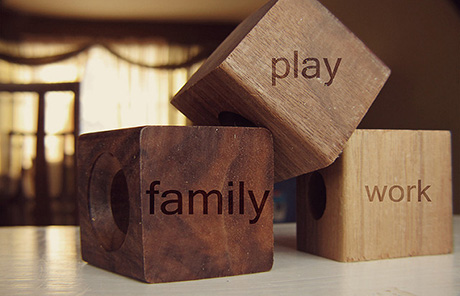
Work-life balance: are you missing out?
- February 26, 2018
A work-life balance is something that we’re often told we need, yet many of us are guilty of throwing ourselves into the work part, forgetting about paying the same attention to the rest of life. So how can you tell if your work-life balance is off kilter? We’ve put together a guide to help you recognise warning signs, how to achieve a more balanced situation, and why it all matters.
Signs your work-life balance is out of sync
The first step to achieving a more harmonious work-life balance is recognising when there could be a problem. If you’ve experienced any of these symptoms it could be a red flag that your work-life split is off balance:
• If you rarely leave the office at 5.30pm it could be a sign that your work-life balance is weighing too heavily towards work. Of course, everyone has those days when something urgent crops up at 5.25pm, but if it’s just you and a few stragglers at 6 o’clock, perhaps your work-life balance needs some attention. If it’s just you and the cleaner in the office at 7.30pm every evening, it’s time to start asking questions.
• You go to work, go home, eat, mindlessly scroll through Netflix and collapse into bed. Maybe you don’t even eat at home, you heat up a supermarket meal in the microwave and eat at your desk. You’ve no time for the gym, socialising or after-work activities. You’ll likely feel exhausted and have little interest in anything once you leave the office: these are clear indicators that you’re mentally drained and suffering from overwork.
• Feeling irritable and resentful towards your job, boss, company, or colleagues is a sure sign that your work-life balance is out of sync. There’s no denying that work can be stressful, and colleagues can be, how shall we say, trying at times. But feeling that way regularly, even daily, is a clear signal that your work-life balance needs reassessing.
How to achieve a work-life balance
When you’re in the cycle of working late and taking work home, either physically or mentally, it can be difficult to get out of the habit. One way to break the cycle is to schedule activities for after work. You could have dinner with a friend or loved one or make plans to go to an exercise class or running group with a friend: anything that involves meeting up with someone else. The activity isn’t important, the key thing is that you’re compelled to leave the office by a certain time and not let someone you care about down.
And if work has got you feeling blue, try incorporating exercise into your daily routine. Not only is exercise good for your physical health, it improves mental wellbeing too. Build exercise into your daily work routine and try cycling or, if it’s practical, running or walking to the office. The physical activity will boost production of endorphins, the body’s ‘happy hormone’, and blast away stress. Not into high-impact activity? Even a stroll around the block at lunchtime will help raise the heartrate, boost endorphins and just expose you to some fresh air and sunlight – that can’t be so bad, can it?
Why a work-life balance matters
There are many reasons to recalibrate your work-life balance if it’s swung too far in favour of work. Perhaps the most significant question to ask yourself is that if you’re not spending non-working hours with loved ones, or pursuing things you enjoy, are you truly contributing to your or their happiness? As the saying goes, nobody ever wishes on their deathbed that they’d spent longer at the office. Most people have to work to live of course, and it’s great if you love what you do. But give your happy hormones a boost and share that passion with the people that matter most. Because – and grab a tissue now, we’re getting deep here – it won’t be your boss, or your client, or Dave from accounts that’ll be by your side until the last.
On a lighter note, doing things outside of work makes you more well-rounded. Playing sport isn’t just good for burning calories and boosting endorphins, it enhances teamwork skills. Being surrounded by work all of the time leaves you mentally drained and with a disinterested attitude to everything else. Different activities stimulate different parts of the brain and can help you think differently, and therefore perform more effectively, while you’re at work. Plus, hobbies are enjoyable! And who would say no to a little more fun?
If you found this blog interesting, check out more of our blogs or if you’re looking for that perfect role, check out all the vacancies we have available.
Want some tips or advice? Call the office on 01772 259121 and speak to one of our experts


